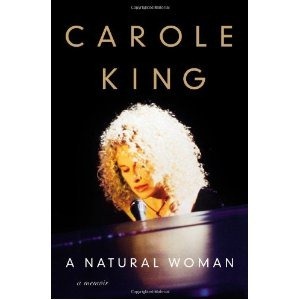If you are a baby boomer , indeed, if you were alive anytime after 1960 and were born blessed with hearing then you have heard a Carole King song. She had her first Number 1 hit at the age of 18, incidentally launching the ‘Girl Group’ craze of the early ‘60s, with the Goffin & King classic, "Will You Love Me Tomorrow". In 1997, she had her last chart topper with “The Reason” which was written for Aerosmith, but performed by Celine Dion. In May 4, 2010 King and James Taylor released an album called Live at the Troubadour, which debuted at No.4 in the United States. In between she had 116 other pop hits, according to Billboard Magazine. Making her, far and away, the most successful female songwriters of the last half of the 20th Century.
As if that wasn’t enough, her 1971 album, Tapestry, won her 4 Grammy Awards as a performer. It also topped the U.S. album chart for 15 weeks in 1971, and remained on the charts for more than six years. Until Michael Jacksons Thriller, it was the biggest selling pop album by a solo artist in history. She still holds the record for the longest time for an album by a solo female to remain on the charts for Tapestry at 306 weeks. An amazing feat when you consider the competition; Madonna, Cher, Aretha, Barbra Streisand, Joni Mitchell, the list is endless and impressive.
Doubly impressive when you take into account she hates touring, and even at the height of her career as a singer & performer she only toured for short stints away from home, as she wouldn’t be separated from her children for any length of time. She also hated being in the spotlight.
But this isn’t about the most successful female songwriter of (probably) all time. And it’s not about the singing sensation with the four Grammys and perhaps the record-est breaking album by a female singer or a solo artist. It’s not even about the woman who , if not the creator of,then certainly is one of the pioneers and legends of the “Singer/Songwriter” genre of the early ‘70s (think Joni Mitchell, Carly Simon, Leon Russell, James Taylor, Jim Croce et al). It’s not even about the woman who has starred on Broadway as the lead actress. It’s not about the woman who was the subject of Neil Sedaka’s first hit song in 1958, about his then girlfriend, Carol Klein who would change her name for a less ‘Jewish sounding’ name to Carole King. It's about A Natural Woman. And it’s about a woman who not only achieved all of those marvelous goals listed above, but who has written one of the most engaging, honest, stories this reader has read in a very long time. And what is more, it’s her story.
Carole King has written a memoir that is not only autobiography but the narrative of a generation. The book isn’t only about Carole King and her life, it is an honest observation into all the cultural phenomena of the past 60 years or so. The birth of rock and roll and it’s impact not only on America’s young, but it’s role in breaking down racial barriers. The British Invasion which would forever change pop music. The civil rights movement of the ‘60s. The drug culture, the hippie movement.The birth of America’s awakening to ecological issues. Women’s Lib, which would not only adopt one of King’s songs as an anthem, but to some extent adopt her.
She also takes us inside the music business itself. From sound checks and a performers thoughts, fears, egos and personality's to the rewards, both financially and artistically. She even falls for Bob Dylan, literally. She fell off of the stage after a performance with Dylan in Ireland and injured herself. The event caused a media storm where they got it mostly wrong, but the thing she remembers most is Dylan’s honest concern, even though it was in no way his fault.
Along the way she writes with her first husband Gerry Goffin, whose brilliance as a lyricist was only eclipsed by his chemical explorations and mental struggles. She goes to school with Paul Simon, Neil Sedaka, Al Pacino, Rafael Campos, the children of Lee Strasberg. She writes with rock/pop luminaries, Bob Dylan, Cynthia Weil, Paul McCarthy, James Taylor, Brian Wilson and so many other giants. Her songs, either in collaboration with other songwriters or singly, were recorded by The Shilelles, The Beatles (“Chains”) the Hollies, Herman’s Hermits, The Everly Brothers, Bobby Vee, Blood Sweat and Tears, the list is a “whose who” of pop music. She has dinner with John and Yoko and confronts John over an earlier insult, and reveals his oh so human side of kindness and concern. She lives next door to The Eagles, Graham Nash (who wrote “Our House” about a house there, where he and Joni Mitchell lived) Leon Russell and the rest of Laurel Canyon musicians, actors and song writers in that early 70s hotbed of creativity. A wonderful moment takes place when she was in the studio to cut the historic record, Tapestry. In the studio on either side of her was James Taylor recording Mudslide Slim and the Blue Horizon, and Joni Mitchell was in the other studio recording Blue. Almost naturally, they all played on each others albums.
Then she moves herself and her children at the very height of her commercial success to a cabin in Idaho that had no running water, electricity, or modern convenience. She bathed and wash laundry in a hot springs and hauled water to cook with and drink by the bucket.
She marries four times in search of the approval of a strong man only to find weakness. She becomes a battered wife, and eventually manages to extricate herself.She also raises four children who become successful in their own right, and maybe that says more about Carole King than anything else.
She talks about the almost religious experience of hearing Aretha Franklin sing the title of this book. “Few people would consider it hyperbole to call Aretha’s voice one of the most expressive vocal instruments of the twentieth century. Hearing that instrument sing a song I had participated in creating touched me more than any recording of any song I had ever written.”
When I started A Natural Woman I read it on my Kindle, and I love the “notes and highlight” function. It’s so useful when you get down to writing the review. Well, I went to look at those notes and highlights when I started this and found that I have , highlighted nearly half of the 496 pages. The book is that memorable and quote worthy. King’s writing style is also engaging. It’s like sitting around the kitchen table listening to a friend tell the story of their life, and finding commonalities to your own. You’ll laugh, you’ll cry you’ll smile in both remembrance of an event and at the jokes life plays on us, great and small. The story is told without bitterness and with very little regret. The story paints the life of one of the greatest songwriters of all time, but it also paint the journey that we all take. There is frustration, compassion, love and the joy of creating, the love of making an audience come alive. There is a spiritual journey and a cultural journey and a personal journey of growth. It is, indeed, a Tapestry woven by the last half of the twentieth century and the start of the twenty-first. She discovers, along the way that the key to success in performing her music is to be authentically herself. She also discovered that that is the key to living life.
The book is available tomorrow, April 10th at all the usual places.
Copyright © 2012 Robert Carraher All Rights Reserved
Article first published as Book Review: A Natural Woman : A Memoir by Carole King on Blogcritics.







No comments:
Post a Comment